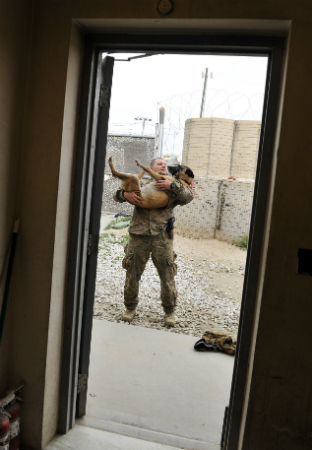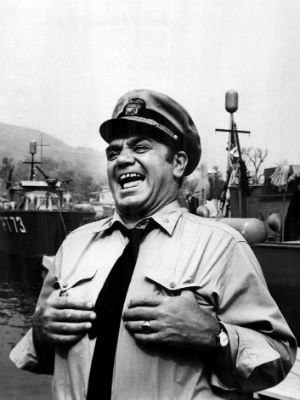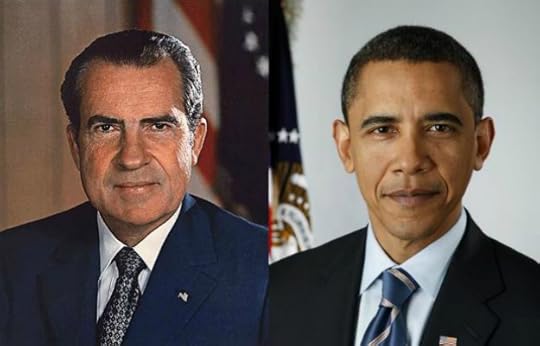Thomas E. Ricks's Blog, page 107
May 20, 2013
JOs, I was sympathetic, but now I'm not. Just take care of your people and move on.

By Capt. Amir Abu-Akeel, U.S. Army
Best Defense guest columnist
I've read the JO retention debate with quite a bit of interest. Initially, I found myself nodding
in agreement with the disgruntled officers, but have since come to re-evaluate
my stance.
Many company
grade officers approach the issue of the military through a narrowly focused,
emotionally tinged lens: "It's too big for me to fix, so why should I stay,"
or "my civilian friends don't put up with this, why should I, and more
importantly, my wife." In most cases their observations are correct. The
military is indeed too big to fix singlehandedly, and it asks a lot more of
people than civilian jobs, but this view lacks nuance and context.
Junior officers
need to understand that they aren't going to singlehandedly right American
foreign policy. Even senior officers have little individual sway over
issues. It's not because the system is broken. Nowadays, most policy
decisions are made on a consensus basis. Contrary to what people think, the
team-first mantra of the military encourages agreement between ranks even in
the presence of a clear chain of command. Leaders don't make decisions in a
vacuum; they listen to the arguments made by their subordinates and peers. Commanders
render judgment only after their staffs have beaten the courses of action to
death. At the company level, if my first sergeant and I needed to hash
something out, we closed the door and talked to each other (often yelled),
until someone's opinion made more sense. Tom's book Fiasco makes the same case: President Bush didn't declare war on
Iraq; the American security establishment did. JOs have not been in long
enough to see this team dynamic play out frequently, and therefore tend to
individualize their problems. If you try to take on the big green machine
alone, it will beat you down every time.
JOs also need to
stop fixating on how they alone will finish the Syrian war, or end government
corruption, and instead focus on the responsibilities that really matter: the
care of their soldiers. It can be as simple as giving subordinates time off on
a Friday afternoon to be with loved ones, or it can be as difficult as serving
as a Casualty Assistance Officer. My personal favorite has always been to fend
off a random tasker from higher (usually some CSM or division staff officer
with a "bright" idea). Strategy is important, and a JO will go far to
comprehend the bigger picture, but the soldiers in their immediate care are the
priority, and that alone will consume the majority of their time. Aesop's fable
about the astronomer rings true here: "Hark ye, old fellow, why, in
striving to pry into what is in heaven, do you not manage to see what is on
earth?" Child's tale, but hey, it's still poignant, and relevant.
As for
considering the career goals of a spouse, I have heard more gripes than
solutions. HRC has always been a problem. The organization has close to a
hundred-thousand officers to manage. Throw in the excessive branch parochialism
and the congressional regulations that restrict officer management, and it's
surprising the command hasn't suffered a meltdown. Adding the requirement
to manage the careers of spouses would probably force the AG Corps to jump off
a cliff en masse. That's not to say we can't improve the lot of spouses. Creating
comprehensive geo-bachelor BAH schemes and offsetting professional
certification costs is a good start, but the pie-in-the-sky ideas people have
been bandying about are unworkable, especially in the face of a giant RIF.
I don't write
this to belittle anyone's issues with the armed forces or the security
establishment at large, because there are many, and they are serious. But at
the end of the day, the military, for all its awesome might, is an organization
run by people, and therefore subject to all their human strengths and weaknesses.
Show some patience and enjoy the simple pleasures that come from caring for
your Joes. You won't get that direct satisfaction in many other places.
Captain Amir Abu-Akeel is currently an operations officer with
the 52d Ordnance Group (Explosive Ordnance Disposal) in Fort Campbell, KY. CPT
Abu-Akeel previously commanded the 788th OD CO (EOD) and the 202d OD CO (EOD). His
bachelorhood has been ensured by two combat deployments and four PCS moves in
the past six years. The views here are his own and don't represent any
government agency, yet.
Here's a reason for Army to get back to basics: It isn't good at remembering them

By Capt. Michael Carvelli, U.S. Army
Best Defense guest columnist
It is true that the U.S. Army does not follow its
own doctrine, and it continues to do so even at the misfortune of soldiers. The
stark lack of critical tasks degrades even the best of units as they plow
through their deployments. It is not complacency, as most senior officers and
NCOs consistently suggest to their commanders and first sergeants. It is
laziness and the belief that "we are good." Wake up: You are not as good as you
think!
This is my third deployment to Afghanistan, this
time as a company commander. The lessons about being prepared have been taught
to me in school and during my time as a platoon leader. They are hard
remembered lessons, several times taught through my own failures or from an
almost disastrous experience. However, I am determined to continually remember
these experiences and ensure those under my command make every attempt to know
them as well.
At this current point in time, the Army has digressed
into creating a CONOP -- a unique misinterpretation of the Concept of the
Operation paragraph contained within the Operation Order (OPORD). At all
levels, from division down to platoon, leaders believe that a Microsoft
PowerPoint slideshow containing multiple images, sketches, and a verbose
explanation sufficiently replaces an OPORD. In fact, it replaces the entire
planning process itself at the cost of detailed planning, war gaming, and
rehearsing.
I make this request: Please go back to the basics.
Set an operational endstate with respect to enemy, friendly, terrain, and
civilian considerations; conduct pre-combat checks and pre-combat inspections; and
conduct rehearsals.
Ask these questions: Why are we here? Do we have
what is needed to conduct the mission? Have we thought through the important
aspects of the mission to ensure we are achieving the endstate and have the
correct tools and equipment to reach it?
We, as a collective organization, have broken all
tenets that are taught in our leadership schools, professional military education
courses, and written in our own doctrine. First, span of control is three to
five. My current battalion operates with nine companies. That is only to conduct
route clearance. We are not even a real maneuver unit. Secondly, the creation
of the Company Intel Support Team has replaced the entire function of the
battalion intelligence section (S2). We create our own named areas of interest,
layer on the various types of intelligence (human, signal, imagery, electronic,
etc.) and attempt to target the enemy without a defined situational template
(SITEMP). Lastly, brigade commanders have withheld the approval authority for platoon
missions. There is even general officer approval for company and battalion
missions. So much for ingenuity, delegation of authority, and confidence in
lower level commanders.
The lack of pre-combat checks (PCCs), pre-combat
inspections (PCIs), and rehearsals in forward deployed units is astounding.
PCCs and PCIs are the first step in assuring that your subordinates are
prepared for their mission. Are their sensitive items tied down? Extra
batteries present? Optics and night vision operational? Weapons clean? Schools
preach these, but I watch the leaders around me fail to apply these lessons.
Rehearsals are sessions in which a unit practices
expected actions to confirm the plan, reveal unidentified coordination
measures, synchronize the overall plan at key points in time and space, and
update all aspects of the plan. Most units show up 20 minutes before their
departure time, make sure everyone is present, tell them what they are doing
today, and leave the base.
My first sergeant and I have "thumped" each of our
platoons for their lack of attention to detail concerning PCCs and PCIs. They
have all had to construct a Platoon Standard Operation Procedure (SOP) for
vehicle load plans and rehearse the reloading of ammunition to the gunner,
conduct rollover and fire drills, and practice every SOP they have developed. Almost
every time, each platoon has changed or enhanced their SOPs solely through
their rehearsals on the base. We are actually achieving progress! Although it
is quite painful and creates more gray hairs than I wish to admit.
I express this frustration in the hope that someone
reads it and realizes that they, too, are not as good as they think. Above all
else, this sobering idea has captured the essence of my company's issues and
has put us on a path to success.
CPT Michael Carvelli is an engineer officer currently deployed in
Afghanistan. He has deployed in conventional and special operations units. This
article represents his own personal views and not those of the Engineer
Regiment, the U.S. Army, the Department of Defense, or the U.S. government.
May 17, 2013
A new military competition: Has your base's sexual assault czar been arrested yet? And yes, there is in fact a silver bullet.

Now the manager of the sexual harassment and
assault program at Fort Campbell, Kentucky, has been busted for allegedly violating a protective order
banning him from contact with his ex-wife, and for stalking her.
This makes me
think even more that the theme of our current thread of discussion is correct: that the generals really haven't cared
enough to put good people in these sexual harassment jobs.
Which means that
President Obama is incorrect when he says that "there's no silver bullet to solving this problem." I
bet he was just repeating what his generals told him. And that indicates that
they are part of the problem, not part of the solution.
Chamberlain's 1st trips in an airplane were the 'Munich' flights of Sept. '38 -- and where was Guy Burgess after Munich?

In the ever-growing
category of things I didn't know:
The first time
British Prime Minister Neville Chamberlain ever flew in an airplane was on 15
September 1938, to see Hitler at Berchtesgarden. Seeking to bolster his policy
of appeasement, Chamberlain flew to Germany twice more that month, first to Bad
Godesberg and then to Munich.
Also, Churchill,
stunned and alone after the Munich agreement, retreated to his country house,
where his first visitor was Guy Burgess, then a producer for the BBC, but of
course also a Soviet spy. No indication that Churchill knew anything about
that.
Both facts from
Martin Gilbert's fine Winston
Churchill: The Wilderness Years.
Rebecca's War Dog of the Week: A postcard pick-me-up from Bagram

By Rebecca Frankel
Best Defense Chief Canine
Correspondent
Handler Staff Sgt. Jonathan Cooper of the 455th
Expeditionary Security Forces Group takes a break with his dog dog, Astra, after
a vehicle-borne improvised explosive device (VBIED) patrol at Bagram Airfield,
Afghanistan on April 29, 2013. Over the past four months, the MWD team has
swept more than 15,000 vehicles, mitigating all VBIED threats to the
installation.
In other news, props to Handler Sgt. Phillip Mendoza and
MWD Benga for taking first place in 2013 USAF Academy Iron Dog Competition in
Colorado Springs last week.
Rebecca Frankel is away from her
FP desk, working on a book about
dogs and war.
May 16, 2013
McHale's Pentagon

A SFC who was working
in sex abuse education was running a prostitution ring on Fort
Hood? Someone needs to stop making this stuff up. Oh, that's right, you can't
make up stuff like this.
I am surprised that SecDef Hagel isn't slugging four stars as they
walk in his office, and then giving them noogies and banging their heads into
the wall. This of course comes on top of the allegedly butt-grabbing AF LTC who was
his service's sexual assault czar. Can you
imagine the damage a guy like that could allegedly do during a year-long tour
at Bagram? ("ILB because someone has enough time during
their deployment to run this website.") And probably has.
Part of the problem: For years, the services have been dumping
non-performers into EO and sexual harassment billets. In other words, they
weren't taking this stuff that seriously. Now they are reaping what they have
sowed.
Or, as Gen. Dempsey, the chairman of the Joint Chiefs, told reporters yesterday, "We're losing the confidence of the women who serve that we can solve this problem. That's a crisis."
Thanks, Dick Cheney!

Just when I was feeling
very unhappy with the Obama
administration, Dick Cheney pops up to remind me of how much worse
things could be -- and were. Joe Klein has the story here.
May 15, 2013
Is Nixon the new model for Obama?

I
always thought that President Obama wanted to model his domestic policy on
Lincoln and his foreign policy on Eisenhower.
But
the news this week of the IRS harrassing
right-wing groups
and the Justice
Department harrassing the Associated Press evokes the Nixon era for me.
On
the other hand, Nixon had better relations with the military (despite
contemplating firing Creighton Abrams in Vietnam).
This
is me really going off the Obama reservation.
Orwell disses Basil H. Liddell Hart

From Orwell's
diaries, 21 September 1942: "Yesterday met Liddell Hart for the first time. Very defeatist and even, in my
judgement, somewhat inclined to be pro-German
subjectively."
I like
this because I was really disappointed when I read Liddell Hart.
Why write for your branch journal? Because you can help your comrades

By Jason Fritz
Best Defense guest respondent
When
my copy of the January-March 2013 issue of The
CAVALRY & ARMOR Journal (the U.S. Cavalry and Armor Association version
of ARMOR Magazine) arrived in the mail a couple of weeks
ago, I was also a bit puzzled by the article titled "How to Eat Steak with a
Knife and Fork!"
Not only because the title motif "How to Eat X with Y" has become quite tired,
but because I expected it to be the beginning of an onslaught of "Armor Rulz!"
articles in future issues. Of course, reading the article you can see that it
is not a paean to maneuver warfare but rather is only a plug for three schools
offered by the Maneuver Center of Excellence at Fort Benning, written by the
commander of those schools.
To
me the biggest issue was not that ARMOR
ran an article about "core competencies," but rather that the publishers used
valuable space in a branch journal to advertise schools that officers and NCOs
should be going to anyway. I do not share Tom's lament on the tactical focus of
ARMOR as it is a journal for armor
units, which are by definition brigades and below and therefore tactical
formations. But his post brings up a prevalent problem: the demise of the
branch journals.
Anyone
who subscribes to their branch journal has probably noticed this decline.
Articles are becoming repetitive. Issues are becoming thinner. I certainly
can't think of a single article in the past two years in ARMOR from which I felt I learned something. In the case of ARMOR, which was first published in
1888, this demise is ill-timed. For the first time in over a generation our
armor force has extensive and varied combat experience and we should not lose
these lessons. And this is true for
every branch. In an introduction to the
Association version of the issue that Tom linked to earlier in the week, MG (R)
Terry Tucker, former chief of Armor and current president of the U.S. Cavalry
& Armor Association, wrote:
I
would like to take a moment to thank all who contribute to this Magazine and
participate in the important discussion of our Mounted Force. However, as
important as it is for our contributors to submit articles based on history, "tactics,
techniques and procedures," or personal experience, our mission challenges us
to exchange critical thought among our members. I believe we too often fall
short in this area in our Cavalry and Armor Journal and in ARMOR Magazine. We
want discussion, differing opinions, and even heated debate when appropriate.
Branch
journals may not be Foreign Affairs, Parameters, or even PRISM, but they are and have been the primary outlet for
professionals at the tactical level to disseminate, discuss, and debate their
tradecraft. Theirs being such a focused audience, you won't find academics
rushing to get published. That leaves it to those of us who have been there and
done it to keep these forums alive; you don't know who needs to know what you
know or what doors writing will open for you. I wrote one article for ARMOR in 2008 while I was still in the
Army. In addition to earning a free year's subscription to the magazine, this
article played a significant role in my securing my first job out of the Army.
The article, titled "Measuring Success in Counterinsurgency Warfare," has been
the publication prospective employers have invariably asked about first because
they recognize ARMOR and because they
are interested in the topic. Recognizing
this success, I shouldn't have stopped at one article -- something I intend to
fix this year.
If
you are a commander in the force, find a way to incentivize your officers and NCOs
to write for their journal -- prospective writers need to know that writing is
valued in their organization. Whether
you are a commander or not, submit articles to your branch's journal (make sure
you abide by their submission criteria). Get your good ideas and your name out
there and put it in print. Branch
journals provide an opportunity for you to influence your community, work on
your writing skills, and maybe help someone who needs the information or idea
you're holding on to.
Jason Fritz
served
as an armor officer in the U.S. Army for six years. He is now a defense
consultant focusing on land power issues and a contributor to the
Ink Spots
security blog.
Thomas E. Ricks's Blog
- Thomas E. Ricks's profile
- 436 followers



